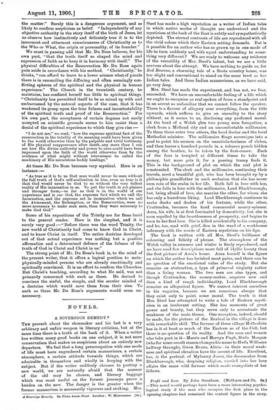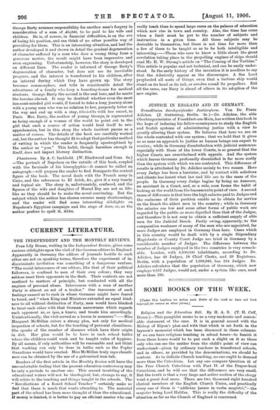Profit and Loss. By John Oxenham. (Methuen and Co. Bs.)
—This novel would perhaps have been a more interesting psycho- logical study if the man who occupies the first place in the opening chapters had remained the central figure in the story. George Barty assumes responsibility for another man's forgery in consideration of a sum of £5,000, to be paid to his wife and children. He is, of course, in financial difficulties, is on the eve of losing his position, and can think of no other possible way of providing for them. This is an interesting situation, and had the author developed it and shown in detail the gradual degeneration of character suffered by a man who does a wrong thing from a generous motive, the result might have been impressive and even engrossing. Unfortunately, however, the story is developed on different lines. The reader is informed of George Barty's degeneration of character, but does not see its inevitable progress, and the interest is transferred to his children, after an interval during which they have grown up. The story becomes commonplace, and tells in considerable detail the adventures of a family who keep a boarding-house for medical students. George Barty the second is the real hero, and he meets the heroine abroad. It may be doubted whether even the most innocent-minded girl would, if forced to take a long journey alone with a young man who was no relation to her, purposely loiter on the way and end up with a stay, ate-a-tete with her escort, in Paris. Mrs. Barty, the mother of young George, is represented as being enough of a woman of the world to point out to the girl that such a course of action would lend itself to mis- apprehension, but in this story the whole incident passes as a matter of course. The details of the book are carefully worked out, but the author has thought fit to adopt that particular method of writing in which the reader is frequently apostrophised by the author as " you." This habit, though harmless enough in itself, does not impart literary distinction.



































 Previous page
Previous page